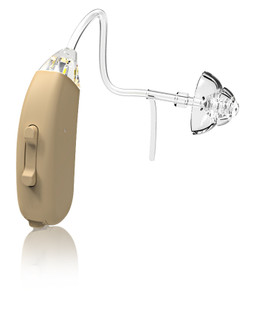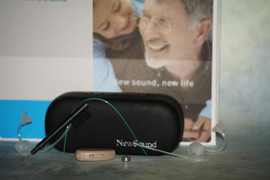Detecting the Subtle Clues to Hearing Loss
Posted by DR Paul on Jul 01, 2024
Hearing loss often creeps up on us, quietly integrating itself into our daily lives without us even noticing. For many, recognizing the early signs can be challenging, but doing so is crucial for maintaining quality of life and seeking timely intervention.
Why Early Detection of Hearing Loss Matters
Hearing is integral to how we communicate and understand the world around us. When we begin to lose this vital sense, it can affect our social interactions, mental health, and even safety. Early detection can help mitigate these impacts by allowing for timely treatment, such as the use of hearing aids from hear-better.com, which can significantly improve hearing and quality of life.
Understanding Hearing Loss
What is Hearing Loss?
Hearing loss occurs when there's a problem with one or more parts of the ear, the nerves coming from the ears, or the part of the brain that controls hearing. It might be mild, moderate, severe, or profound, and it can affect one or both ears.
Types of Hearing Loss
There are three main types of hearing loss:
Conductive Hearing Loss: This happens when there are problems with the ear canal, eardrum, or middle ear and its little bones.
Sensorineural Hearing Loss: This occurs when there is damage to the inner ear or the nerve pathways from the inner ear to the brain.
Mixed Hearing Loss: This is a combination of conductive and sensorineural hearing loss.
Common Causes of Hearing Loss
Hearing loss can stem from various factors, including aging, exposure to loud noises, infections, and genetic predisposition. Understanding the causes can help in taking preventive measures.
Early Signs to Watch For
Difficulty Following Conversations
One of the first signs of hearing loss is difficulty following conversations, especially in noisy environments. You might find yourself asking people to repeat themselves frequently or struggling to keep up with group discussions.
Turning Up the Volume
Do you often find yourself turning up the volume on the TV or radio? This can be a subtle sign that your hearing isn't what it used to be. If others complain that the volume is too loud, it might be time to get your hearing checked.
Ringing in the Ears
Ringing, buzzing, or hissing sounds in the ears, known as tinnitus, can often accompany hearing loss. While tinnitus can have various causes, it’s important to consider hearing loss as a potential factor.
The Impact of Ignoring Hearing Loss
Social Isolation
Untreated hearing loss can lead to social isolation. When it's hard to understand what people are saying, it becomes easier to withdraw from social interactions rather than face the frustration of miscommunication.
Cognitive Decline
Research has shown a link between hearing loss and cognitive decline. The brain works harder to process sounds, which can take a toll on mental functions like memory and concentration.
Emotional Well-being
Hearing loss can impact your emotional well-being, leading to feelings of frustration, embarrassment, and anxiety. Addressing hearing loss early can help mitigate these emotional impacts.
When to Seek Professional Help
Regular Check-ups
Regular hearing check-ups are essential, especially if you notice any early signs of hearing loss. An audiologist can perform tests to determine the degree and type of hearing loss and recommend appropriate interventions.
Sudden Hearing Loss
If you experience sudden hearing loss, seek immediate medical attention. Sudden hearing loss can be a sign of a serious medical condition that requires prompt treatment.
Persistent Symptoms
If you have persistent symptoms like difficulty following conversations, ringing in the ears, or needing to turn up the volume, it’s crucial to consult a healthcare professional. Early intervention can make a significant difference in managing hearing loss.
Exploring Treatment Options
Hearing Aids
Hearing aids are a common and effective solution for many types of hearing loss. Modern hearing aids, available at hear-better.com, are discreet, powerful, and can significantly improve your quality of life by enhancing your hearing ability.
Cochlear Implants
For severe hearing loss, cochlear implants might be an option. These are electronic devices that bypass damaged parts of the ear and directly stimulate the auditory nerve, providing a sense of sound.
Assistive Listening Devices
Assistive listening devices (ALDs) can help in specific situations, like watching TV or talking on the phone. These devices amplify sound and reduce background noise, making it easier to hear.
Lifestyle Adjustments to Support Hearing Health
Protect Your Ears
Protect your ears from loud noises by wearing ear protection in noisy environments. Avoid prolonged exposure to loud music or sounds to prevent further damage to your hearing.
Healthy Diet
Maintaining a healthy diet rich in vitamins and minerals can support your overall health, including your hearing. Nutrients like omega-3 fatty acids, magnesium, and vitamins A, C, and E are known to promote ear health.
Regular Exercise
Regular exercise improves blood flow to all parts of the body, including the ears. Activities like walking, swimming, and cycling can contribute to maintaining good hearing health.
Building a Support Network
Family and Friends
Don’t hesitate to share your hearing concerns with family and friends. They can provide emotional support and help you manage the challenges of hearing loss.
Hearing Loss Communities
Joining a community of people experiencing similar challenges can provide valuable insights and support. Online forums, support groups, and local organizations can connect you with others who understand what you’re going through.
Professional Guidance
Seek guidance from audiologists and hearing specialists who can offer professional advice tailored to your specific needs. They can help you explore treatment options and make informed decisions about your hearing health.
The Role of Technology in Managing Hearing Loss
Smartphone Apps
There are several smartphone apps designed to assist individuals with hearing loss. These apps can amplify sound, transcribe conversations, and even provide hearing tests.
Telehealth Services
Telehealth services make it easier to consult with hearing specialists from the comfort of your home. Virtual appointments can provide timely advice and support without the need for in-person visits.
Advanced Hearing Aids
Modern hearing aids come with advanced features like Bluetooth connectivity, noise reduction, and customizable settings. These features enhance the user experience and make managing hearing loss more convenient.
Maintaining a Positive Outlook
Stay Engaged
Staying engaged in social activities and hobbies can help maintain a positive outlook. Don’t let hearing loss deter you from enjoying life; find ways to adapt and stay connected.
Set Realistic Goals
Set realistic goals for managing your hearing loss. Whether it’s learning to use new technology or attending support group meetings, achieving these goals can boost your confidence and well-being.
Celebrate Small Wins
Celebrate small wins along your hearing loss management journey. Every step towards better hearing health is a victory worth acknowledging.
Conclusion
Recognizing the early signs of hearing loss is vital for taking timely action and preserving your quality of life. By staying informed, seeking professional help, and exploring treatment options like hearing aids from hear-better.com, you can manage hearing loss effectively and continue to enjoy life to the fullest.
For more information on how to detect and manage hearing loss, visit hear-better.com today. Join our community of proactive individuals and take the first step towards better hearing health.










